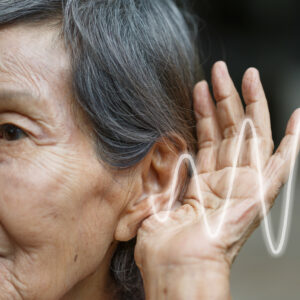Sounds Good: The Latest Advice On Hearing Loss, Hearing Aids, And Tinnitus

Sounds Good: The Latest Advice On Hearing Loss, Hearing Aids, And Tinnitus
February 15, 2023
No doubt there’s been a lot more attention paid in the media to hearing loss and the availability of hearing aids, now that over-the-counter hearing aids are available to any adult who perceives he or she has mild-to-moderate hearing loss. As we’ve previously written, the causes of adult hearing loss can be many, including a genetic predisposition, work history in noisy environments, trauma from physical injury or noise exposure, ear wax, or even just due to aging, as hair cells within your ear grow old, die off, and are not replaced. One in three people between ages 65-74 have some amount of hearing loss and nearly ½ of those over 75 have difficulty hearing. In fact, with the prominent use of earbuds and headphones these days, it’s anticipated that millions more younger people will be at risk for hearing loss from the loud music or sound often blasting through their tiny speakers directly into their ears. Many of these individual listening devices are turned up to decibel levels well beyond what’s considered acceptable for the human ear.
But as available as hearing aids now may be (though perhaps still too expensive for many) you first have to realize and acknowledge you have a hearing problem before you can get the life-changing help that a hearing aid may provide. And for many, that’s a real problem. For example, according to a 2016 study cited by The New York Times, among adults who believed their hearing was excellent or good, nearly 25 % of them actually tested as having measurable hearing loss. How can that be? If you’re able to function despite a mild or moderate amount of hearing loss, your brain may adapt to the loss so that you lose the realization that you’re not hearing all you could be. The Times article goes on to provide clues that in fact, you may have lost some of your hearing. For example, can you hear someone speaking but misunderstand the actual words? Do you have trouble keeping up a conversation in a group or social setting? Do you feel like people are mumbling at you these days? Is your television turned up to the max but you’re still not hearing it all? (But check out this recent video from VOX as to why, in fact, it may not be your fault that you’re not hearing everything on your tv- and why subtitles may be the way to go!). If you have any doubts or are tired of people insisting you don’t hear well, the most obvious next step is to have your hearing checked by an audiologist (you can do this without agreeing to buy a hearing aid) or check out one of the online options now available to have your hearing tested.
With the new year has come new sets of evaluations and recommendations concerning which are the best hearing aids for you to purchase, both prescription and over-the-counter models. Regarding prescription hearing aids, which may offer better personalization but can be much more expensive, Consumer Reports recently published its list of Best and Worst Hearing Aid Brands and Retailers. Consumer Reports members spent an average of $2680 out of pocket to buy their prescription hearing aids as reported in a late 2021 survey. Alternatively, if you’re hoping to spend less (perhaps a lot less), Forbes recently published its own list of the Best Affordable Hearing Aids, all available over the counter, some for as little as $799 a pair. The New York Times Wire Cutter section also has a list of the best over-the-counter hearing aids now available. Forbes also recently published a list of the best hearing aids for people who suffer from tinnitus. Given that 16 million people are said to seek help for tinnitus each year, and it’s thought to be accompanied in almost all cases by underlying hearing loss, knowing which hearing aids might help mask the irritating sounds of tinnitus could be a real blessing.
Tinnitus has also recently had a light shined on it, perhaps because of its connection to COVID or perhaps because of a new Danish study that found noise from traffic could be a trigger for the onset of tinnitus. The ringing, whistling, or pulsing sound you experience with tinnitus can also be brought on by stress (or be a source of stress) and can also affect your quality of life by impairing your ability to sleep or concentrate. It’s thought that 10-15% of Americans suffer from tinnitus, and while there are no cures (and in fact, it may be a symptom of some other underlying issue), there are ways to lessen its intrusion in your life or mask the annoying sounds. For a full tutorial on tinnitus, its possible causes, and ways to address and ameliorate its symptoms, turn up the volume (though not too loud) and watch here.







